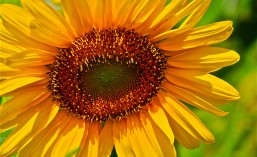Though you lose all hope,
there is still hope,
and it loves to surprise.
~Robert Brault


Goodbye January and hello February! Whew, January is a long month, isn’t it?! So much so that it makes my hope very hungry indeed. Dada, dada da da da! I said hello, February…well hello February…It’s so nice you’ve finally come around again. You’re lookin’ swell, February…And time will tell February…That spring’s a comin’ February… Okay, to appreciate my attempt here at “cleverosity” with the previous lines, you have to try to remember a song from a musical by the same name called HELLO DOLLY. Okay, so maybe it was a lame attempt, but today is just that kind of day, one that puts a song in my heart. Why? Why you ask? Well…
About the time the barrenness of winter starts putting asunder all hope of anything different, February saves the day by bringing forth visible signs of the new spring. And so it did this year on its very first day. After I’d watered and waited and watched the bulbs I’d started weeks ago in the greenhouse, I was rewarded today with several emerging buds. The result: squeals of joy peeled forth inside its walls along with hallelujahs and praise for such glorious surprises amid winter’s gloomy, brown and beige drabness. But they’re just flowers some might say, but pshaw! They are pieces in the puzzle of Creation itself, blessed and holy and full of purpose. They’ve been touched by the very hand of God and then ordained as part of the faithful and reoccurring provision not only for man’s needs but for his pleasure as well. And if flowers are inconsequential why are so many poems and pieces of literature devoted to them, and why are they considered by many as desirable gifts, and why are their scents revered for use in perfumes, and why have they been worth at times more than gold?
“Come, therefore, let us enjoy the good things that exist, and make use of the creation to the full as in youth. Let us take our fill of costly wine and perfumes, and let no flower of spring pass us by. Let us crown ourselves with rosebuds before they wither…” ~Wisdom 2:6-8 ✝




